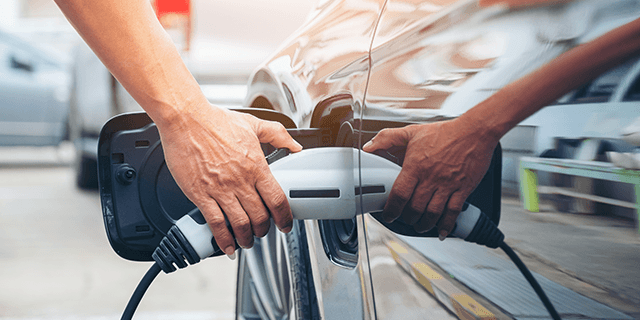The mustard.co.uk guide to electric cars – how much they cost, how well they work, and whether you should consider one.
With the announcement that the UK government will ban the sale of petrol and diesel cars from 2030, as well as a global pandemic changing people’s driving habits, there’s never been a better time to make the switch and buy an electric car.
Internal combustion-engined cars – that is to say, petrol and diesel-powered models – aren’t going anywhere for a little while, but the future’s coming fast. And with improvements in charging infrastructure, through the proliferation of home chargers and public charging stations, running an electric car is fast becoming almost as convenient as their plugless siblings.
Just a few years ago you’d barely consider an EV (electric vehicle) as a second-car runabout. But these days their real-world range and capabilities mean that for more people than you might think they can fill the duties of a family’s only car.
Some can travel over 300 miles between charges, many have space for a full family and all their luggage, and many others have performance figures that would shame a supercar. Regardless, all are cheap to run, with zero road tax and 0% benefit-in-kind tax for company car drivers.
Despite all these improvements, electric cars aren’t quite suitable for all lifestyles just yet. But do they suit yours? Read on for the mustard.co.uk guide to whether an electric vehicle is the right choice for you. We’ve also busted some common electric car myths if you’re still on the fence about switching.

What is an electric car?
Electric cars really are as simple as they come. Instead of an engine and fuel tank, they use an electric motor and a battery pack – think like a child’s remote control car on a massive scale.
Driving one is very much like an automatic petrol or diesel car. But instead of filling them up with fuel, you plug them in to charge the batteries up.
In the last few years, the number of different models available on the market has skyrocketed, and now there truly are electric cars to suit every need. Whether you’re simply after a city runaround to use as a second car, or a full-sized SUV to accommodate the family, kids, and all their associated clobber, there’s something out there for you.
Which electric car should I buy?
We particularly recommend cars such as the Tesla Model 3 and Renault Zoe which our sister site Parkers.co.uk awarded Best Large and Small Electric Car respectively in their 2021 New Car Awards.
As with any car purchase, though, it’s best to thoroughly research. Making sure that the EV you’re thinking of can handle the types of journeys you regularly undertake, as well as accommodate your family and their luggage with room to spare.
How do I drive an electric car?
Electric vehicles usually fall into two camps. Some car manufacturers make their EVs as similar to a petrol or diesel car as possible – disguising their high-tech underpinnings with bodywork and interiors virtually identical to their combustion-engined counterparts. Take Peugeot’s e-208 – almost exactly the same as the standard Peugeot 208, with only a coloured badge and discreet ‘e’ logo to mark it out as an EV.
Others prefer for them to stand out, and make the electric models distinct from the rest of the range with unique styling or super-techy interior fixtures and fittings. A great example of this is the Honda E, which looks totally unlike the rest of Honda’s range and features no fewer than five screens across the dashboard.
The actual driving experience, though, is pretty common to all EVs. Simply put them into Drive and set off, and you’ll likely be amazed. Electric cars are smooth and silent, thanks to their lack of moving parts or gears. They also offer remarkable acceleration at lower speeds, making them effortless for nipping around town and capable of surprising people off the traffic lights.
Regular motorway users might find that smaller electric cars have their power tail off at faster speeds – it’s not unbearable, just unusual, especially if you’re used to the way a petrol or diesel car responds.
How do I charge an electric car?
There are a few ways in which to charge your electric car. Almost every owner – at least those who have off-street parking – opts for a home charge point.
These are installed on your driveway and in your garage and allow faster and safer charging than you’d get from a regular three-pin wall socket. They’ll fill up your battery overnight, leading most owners to treat their car like their mobile phone – simply plug it in in the evening and wake up to a fully charged battery.
Getting a home charging point is easy – most electric car purchases will have one included as an added bonus. If it doesn’t, don’t despair – many companies will fit them. And there’s a Government grant available to cover up to £350 of the cost under the Electric Vehicle Homecharge Scheme.
Many electric car owners find plugging in at home far more convenient than running a petrol car, as there’s never a need to make a journey specifically to get fuel.
If you exhaust your battery while out and about, or need to take a long trip, there are thousands of public charging stations dotted all over the country. These can often be accessed with just a contactless payment card, though some do require you to have a membership.

How much does an electric car cost to buy?
Electric cars do command a premium when it comes to purchase price – they’re usually quite a few thousand pounds more expensive than a petrol or a diesel rival, even with a government grant of £2,500 applied to all new EV purchases.
For reference, the cheapest electric car on sale costs nearly £20,000 after this grant – the cheapest new petrol car is less than half of that.
That’s not the whole story, of course. Car manufacturers often fill electric cars with premium equipment, making them more comparable to top-spec rivals. They also tend to have really impressive performance and acceleration, easily outshining an entry-level model.
Better yet, electric cars can be offered on generous finance or lease deals – and thanks to government incentives attract minimal bills if you run one as a company car. And the purchase price is only one part of the story…
How much does an electric car cost to run?
Running costs are where electric vehicles play their trump card. Electricity costs far less per mile travelled than even the most efficient petrol or diesel car. And if you’re able to charge at home overnight you can take advantage of Economy 7 or smart tariffs, allowing you to schedule charging when the energy is cheapest.
Our sister site Parkers has made this especially easy to understand with its miles per pound tool, which shows just how much cheaper an electric car can be to run than even a very efficient petrol model.
Take the Nissan Qashqai – in its most efficient diesel form, £1 worth of fuel will allow you to drive for 9.0 miles.
The Nissan Leaf, however, will achieve 26.9 miles on £1 worth of electricity, making it nearly a third less expensive to run on a daily basis.
That calculation is based on charging at home – but what happens when you need to charge up while out and about? Well, the difference is much less prominent, but even the most expensive public charging stations undercut the price of petrol or diesel.
Other running costs would appear to be minimal. Most electric cars are too new to have long-term data on their reliability, but early signs are very good, as with very few moving parts these are reliable machines. Some manufacturers, notably Kia and MG, offer super-long warranties on their electric cars for some added peace of mind. Almost every manufacturer provides a warranty against the battery failing to hold a charge.
As for insurance, electric cars tend to attract slightly higher premiums than petrol or diesel models. To help minimise that, you can get a quote for your electric car right here on mustard.co.uk to ensure you’re getting the best deal possible.
How far can I drive an electric car?
That depends on which model you buy, but range is not necessarily linked to how much you spend – some very reasonable electric cars are capable of impressive ranges.
The distance an electric car can go on a full charge ranges from around 75 miles for the more basic city cars, right up to 379 miles for the longest-range model currently on sale.
If you’re mostly driving in town, you’ll probably find these range predictions to be accurate. Head out for long motorway drives and the range tends to disappear a bit faster.
The most important thing is to consider the journeys you do every day, rather than planning for one that may never happen. If you only use your car for short runs around town (remember, more than 90% of journeys in the UK are less than five miles) then almost any electric car will do you well.
Regular long trips could be a reason to spend more money. But even then, taking an enforced break to recharge your car every four hours/200 miles or so is by no means a bad thing.
What do the experts think?
“2020 is the year electric cars entered the mainstream,” said Tim Pollard, digital editorial director of Parkers.co.uk. “We’re seeing prices fall, battery range increase, and a greater choice of EVs in showrooms. Slowly, but surely, the barriers to entry are being removed – you’ll still pay more to buy an electric car today over a petrol or diesel equivalent, but the difference is shrinking. And from you moment you pick up the keys, you’ll be saving all the way, with substantially lower fuel bills, next-to-no company car tax, and that feel good glow that you’re doing your bit to ease up on carbon emissions.”
So should I buy an electric car?
The answer is yes, unless your lifestyle dictates otherwise. There’s no escaping that electric cars are still expensive to buy (whether new or used) and that having off-road parking so you can charge at home is nearly essential.
Some people may also find their annual mileage or where their journeys take them to be a sticking point. For everybody else, though, an electric car could prove a sound and environmentally-friendly purchase. Take the plunge into electric car ownership and you’ll be joining an ever-expanding and vibrant community of like-minded people who tend to love their cars. You’ll be having fun – we’ve never found an electric car we didn’t enjoy driving – and saving money at the same time. What’s not to like?
For more information on electric vehicles and how to insure them, you can visit our electric car insurance page. Start your online quote today or get in touch with the team over the phone on 0330 022 8814.








